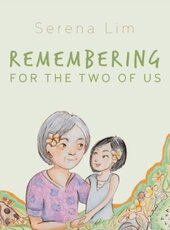Playback speed:
A family member’s dementia impacts the entire family, including children. Parents may wish to shield young children from the reality of their loved one’s condition, but it is best to broach the topic with them soon after the diagnosis. Children are often able to sense tensions in family dynamics arising from your loved one’s diagnosis of dementia and may be able to adjust better to these changes if they are informed.
It can be difficult and frightening to witness the cognitive decline and changing behaviours of a loved one. Helping children to understand your loved one’s dementia may help them feel less confused or hurt by these behavioral changes. It may help to plan the conversation ahead of time, and plan activities that children can do together with your loved one who has dementia. Ask your loved one with dementia if they would like to be included in the conversation. Here are some general tips to plan the conversation:
Name the condition and explain the symptoms using clear, direct language
You may want to go in-depth into the type of dementia for older children. You may need to repeat your explanations several times, and simplify the terms used depending on your child’s level of comprehension.
Acknowledge your feelings to your children
Anticipate questions and guilt
If your children have experienced episodes of your loved one forgetting them, emotional outbursts or accusations of misplacing/stealing things, they may internalise your loved one’s words and actions; feeling guilt or hurt over them. Explain that the disease makes it hard to remember, but that your loved one still cares for them. Remind them to play along instead of contradicting what your loved one says, even if it is inaccurate.
Be positive, but honest
Tell children it is still possible to live well with dementia
Depending on children’s age and development, you may want to involve them in caregiving
Here are some books (arranged by recommended reading age), videos and web resources meant for children that help explain dementia and what they can expect.
Children's Books on Dementia
The titles listed below are either available for download or borrowing from the National Library (NLB).
by Serena Lim, illustrated by Elieth Sardinas (Ages 3-7)
This book seeks to help children make sense of the often bewildering mental, emotional and behavioural changes affecting those with dementia. Combined with workbooks and activities, young readers learn through Agnes’s story and discover how they can make a positive difference by helping persons with dementia live with dignity and purpose.
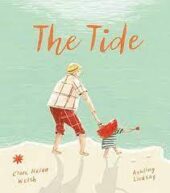
by Clare Welsh, illustrated by Ashling Lindsay (Ages 3-7)
“Grandpa’s memories are like the tide,” Mommy explains. “Sometimes, they’re near and full of life. Other times, they’re distant and quiet.” This book naturally incorporates simple strategies the protagonist employs to cope with the changes in Grandpa’s mental state.
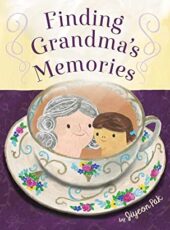
by Jiyeon Pak (Ages 3-7)
Grandma loves teatime, so does her granddaughter – from picking out a special cup, to brewing the tea, to sharing stories at the table. But lately, Grandma seems forgetful. How one little girl helps her grandmother remember their special ritual makes for a heartwarming story that will strike a chord with any family coping with elderly relatives who suffer from memory loss.
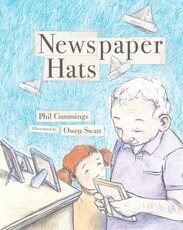
by Phil Cummings, illustrated by Owen Swan (Ages 4-7)
A little girl, Georgie, visits her grandfather in the nursing home where he is suffering from memory loss, and manages to reconnect with him when they make newspaper hats for everyone. This illustrated book portrays the difficulties and nuances of memory loss from a child’s perspective, with an uplifting ending leaves readers with hope.
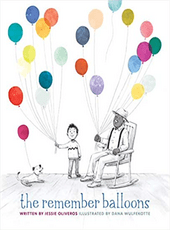
by Jamie Oliveros, illustrated by Dana Wolfekotte (Ages 4-7)
James’s Grandpa has the best balloons because he has the best memories. He has balloons showing Dad when he was young and Grandma when they were married. But when Grandpa’s balloons begin to float away, James is heartbroken. No matter how hard he runs, James can’t catch them. This tender, sensitive picture book gently explains the memory loss associated with ageing and diseases such as Alzheimer’s, and how children might maintain their connection to grandparents in reminiscence.
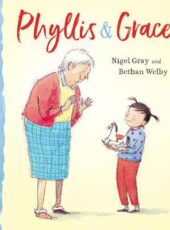
by Nigel Gray, illustrated by Bethan Welby (Ages 4-8)
Grace is a little girl, and Phyllis is the old lady next door. Phyllis lives alone and her memory is fading, but that does not stop Grace from liking her. They find that, despite the gap in their ages, they have much in common and a moving and enduring friendship is born. This book depicts the deeply touching story of how a little girl befriends her elderly neighbour who has dementia. The sensitive and engaging illustrations are beautifully observed.
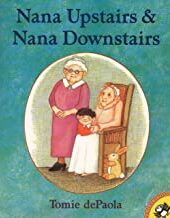
by Tomie daPaola (Ages 4-8)
Tommy is four years old, and he loves visiting the home of his grandmother, Nana Downstairs, and his great-grandmother, Nana Upstairs. But one day Tommy’s mother tells him Nana Upstairs will not be there anymore, and Tommy must struggle with saying good-bye to someone he loves. Updated with new, full-colour illustrations, this true story gently introduces young readers to the topic of death and loss.
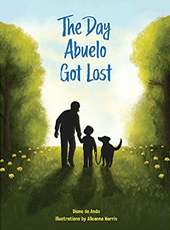
by Diane De Anda, illustrated by Alleanna Harris (Ages 5-9)
A touching story about a boy and his grandfather who enjoy a special bond until Abuelo starts to lose his memory. Luis now has to find new activities for them to do together and in the process Luis realises that they still love each other. This book was named Most Inspiring Children’s Pick Book in 2020 and won the Latino Book Award.
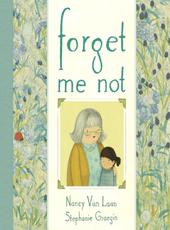
by Nancy Van Lean, illustrated by Stephanie Graegin (Ages 6-8)
Young readers are given an emotionally powerful yet accessible introduction to what it is like having a close family member with Alzheimer’s disease in this deeply resonant story about the relationship between a girl and her grandmother.
This book is helpful for explaining more difficult behaviour changes to young children.
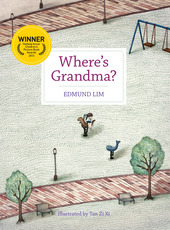
by Edmund Lim, illustrated by Tan Zi Xi (Ages 5-9)
Luke is a little different from other boys his age. His best friend is his Grandma. They would do everything together – walking to school, strolling in the park, and playing in the playground. That was before Grandma’s fall. Everything changed after that. A poignant story of how one boy copes with losing his beloved Grandma to Alzheimer’s disease only to discover something more powerful. Tan Zi Xi’s sensitive illustrations capture the pathos brilliantly. This book was selected for the National Library Board’s READ! Singapore programme for 2012.
Available in English, Tamil, Malay and Mandarin.
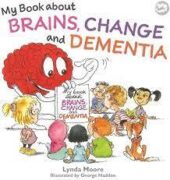
by Lynda Moore, illustrated by George Haddon (Ages 5-8)
What does dementia do to the brain? How can we help if someone we know, like a parent or a grandparent, has dementia? This book breaks down misconceptions about dementia and speaks directly to children aged under five about the realities of the disease, using age-appropriate language in an engaging and informative way.
This book broaches the subject of death, so parents may want to supervise reading with their children.
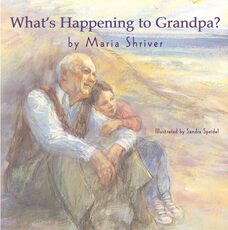
by Maria Shriver, illustrated by Sandra Speidel (Ages 6-9)
Kate has always adored her grandpa’s storytelling, but lately he has been repeating the same stories again and again. One day, he even forgets Kate’s name. Her mother’s explanation opens Kate’s eyes to what so many of the elderly must confront: Alzheimer’s disease and other forms of memory loss. A little word-heavy, this book shows how children might talk about their grandparents’ dementia with other children.

By Christine Honders (Ages 7-10)
Why doesn’t grandma remember my name? Why does grandpa have to move into a care home? This book will help young readers understand what Alzheimer’s disease is and provides them with healthy coping strategies.
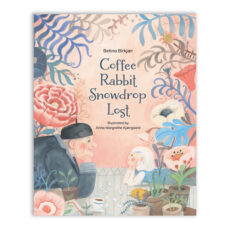
by Betina Birkjær, illustrated by Anna Margrethe Kjærgaard, translated from Danish by Sinéad Quirke Køngerskov (Ages 7-10)
Stump’s grandfather starts to lose his memory – and his words, which literally fall from him. Stump tries his best to keep the lost words safe, collecting them in a special box. But Grandpa seems to forget more and more everyday, and the situation comes to a head one snowy night when Stump wakes up to find Grandpa missing.
This book provides honest and sensitive insights into difficulties in relationships impacted by dementia. It includes an afterword to the parent/guardian about dementia and recollection, written by Ove Dahl, a historian and head of the Danish Center for Reminiscence.
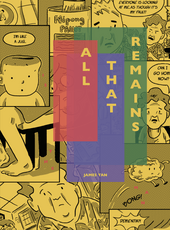
by James Tan (Ages 9+)
Inspired by real-life experiences, All That Remains weaves the personal stories of families touched by dementia into a moving and richly illustrated graphic novel suitable for children and young adults. Part of the Forget Us Not initiative by Lien Foundation, Dementia Singapore (formerly Alzheimer’s Disease Association) and Khoo Teck Puat Hospital.

by S. E. Durrant (Ages 9+)
Iris’s grandmother, Mimi, starts wearing her clothes inside out, serving jam on scrambled eggs and talking to the moon. As Mimi’s life becomes more muddled up and a mystery from the past surfaces, Iris and her friend Mason must search for answers. A moving story of a grandmother living with dementia, told from her granddaughter’s perspective.
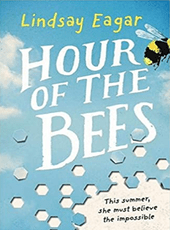
by Lindsay Eagar (Ages 9-11)
Twelve-year-old Carol is spending her summer, helping her parents move Grandpa Serge into a home for people with dementia. Carol finds herself drawn to him, fascinated by the crazy stories he tells her about a healing tree, and the bees that will bring back the rain and end a hundred years of drought. This is a captivating novel about family, renewal, and discovering the wonders of the world.
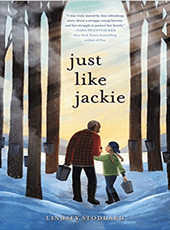
by Linsey Stoddard (Ages 9+)
For as long as Robinson Hart can remember, it has just been her and Grandpa. He teaches her about cars, baseball, and everything else worth knowing. But Grandpa’s memory has been getting bad — so bad that he sometimes cannot even remember Robbie’s name.
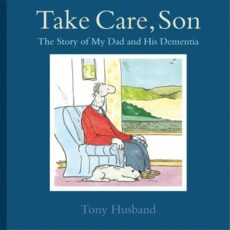
by Tony Husband (Ages 11+)
Hi Dad . . . can we have a chat about your dementia . . . Can you remember how it started?
When Ron Husband starts to forget things – dates, names, appointments . . . daft things, important things – it takes a while to realise that this is “a different form of forgetting.” But it is just the first sign of the illness that gradually takes him away from the family he loves. An emotional, personal account written from the perspective of an elderly father diagnosed with dementia, this book may aid children to empathise with a family member’s experience of dementia.
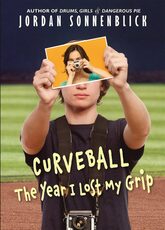
by Jordan Sonnenblick (Ages 12+)
After an injury ends former star pitcher Peter Friedman’s athletic dreams, he concentrates on photography. This leads him to a girlfriend, new fame as a high school sports photographer, and a deeper relationship with the beloved grandfather who gives Pete all of his professional camera gear after realising he has dementia. A good book for teenagers navigating difficult changes and grandparents’ dementia.
Special thanks to the National Library Board (NLB) for contributing to the book list.
Video Resources
Dementia-Friendly Kebun Baru:
Conversations with Dementia
Source: Our Kebun Baru, St. Luke’s Eldercare, Dementia Singapore
Dementia-friendly Kebun Baru is a series of four videos, featuring candid conversations between children and seniors with dementia living in the Kebun Baru Community. Despite dementia, conversations with the seniors do not have to be difficult for children.
Our Grandfather Story – Can Ask Meh?
Living with Dementia: Will You Ever Forget Me?
Source: Our Grandfather Story
Hear about persons living with dementia and their caregivers on this episode of ‘Can Ask Meh?’. This casual interview offers children a look into how family dynamics may be changed by dementia, and inspires hope for the family to remain connected.
#DementiaFriendlySG Exhibition
Sharing by Peter, Evon, Maia & Maesi
Source: Dementia-Friendly Singapore
Hear from Peter and Evon Estrop, and their granddaughters Maia and Maesi on how they support and care for each other through their journey with dementia.
Tell us how we can improve?
Read Next
- Alzheimer’s Society. (2022, April 1). How to talk about dementia with children and young people. https://www.alzheimers.org.uk/get-support/daily-living/how-talk-dementia-children-young-people
- Bright Horizons Education Team. (2020, January 15). Talking to Children About Alzheimer’s Disease.
https://www.brighthorizons.com/family-resources/talking-to-children-about-alzheimers-disease - Five Star Senior Living. (2020, March 06). 5 Tips for Talking with Kids about Alzheimer’s Disease.
https://www.fivestarseniorliving.com/blog/5-tips-for-talking-with-kids-about-alzheimers-disease - Hicks, K. (2018, November 28). Teaching Children How to Talk to Loved Ones With Dementia. Alzheimers.net.
https://www.alzheimers.net/teaching-children-how-to-talk-to-loved-ones-with-dementia - Mayo Clinic Staff. (2020, June 12). Alzheimer’s: Helping children understand the disease.
- Sollitto, M. (2021, July 7). How to Explain Alzheimer’s to a Child. Aging Care.
https://www.agingcare.com/articles/telling-children-grandma-grandpa-has-alzheimers-disease-147667.htm - Thurott, S. (2021, December 17). The Best Way to Talk to Your Kids about Dementia. Banner Health. https://www.bannerhealth.com/healthcareblog/advise-me/heres-the-best-way-to-talk-to-your-kids-about-dementia


